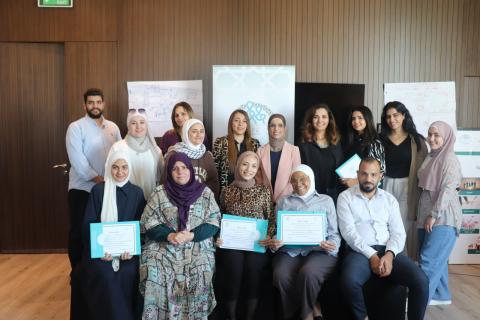

The Higher Population Council organized a specialized training program to introduce the national standards document for youth-friendly reproductive and sexual health services, October 22-25, 2023. The program, conducted with the support of Oxfam, and within the stages of the Masarna 2023 Partners Project, was designed to target the personnel of counterpart associations operating with youth in the field.
The first stages of the project included identifying and building a needs assessment through examining the current situation in associations who are partners in the project. Associations included the following: The Jordanian Women’s Union Association, Tamy Foundation for Human Development, Naya Community Network, Sawa’id Organization for Community Empowerment, Darabzeen Organization for Human Development, and Hekaya Centre for Civil Society Development.
Included in the second phase of the project was the enactment of a specialized training program which dealt with a comprehensive analysis of each of the eight standards included in the National standards document for youth-friendly reproductive and sexual health services. During the workshop, the main standards and sub-standards were addressed at the level of inputs, operations and outputs.
During the opening session, HPC Assistant Secretary General, Ms Rania Al-Abbadi, commended HPC partnership with Oxfam in supporting the project of Masarna partners. Ms Abbadi stressed the importance of this project which came in line with HPC objectives in safeguarding the health and well-being of the youth being one of the basic pillars of any society. According to Abbadi, youth who constitute 20% of the total population of Jordan, do not always receive the necessary attention and they also lack youth friendly information on sexual and reproductive health while being the group most in need of health services that are quite often not met. Hence, providing an integrated package of sexual and reproductive services for youth is crucial to help youth make sound decisions regarding their sexual and reproductive health and enabling them to apply these decisions in conformity with the Jordanian cultural and social context.
In her turn, Mais Al-Saidi, Director of the Gender Equity Project /Masarna Project, valued the partnership with HPC, highlighting the importance of educating the young on reproductive health issues, especially since they represent the future. Ms Sai’di reiterated that this phase in their lives is viewed as an exploratory and fact-finding stage, so it must be secured that the young receive the correct and reliable information that satisfies their needs and helps safeguard them.
The training program included specialized sessions presented by Ms Rania Al-Abadi, HPC Assistant Secretary-General, Ms Badia Qubilat, HPC coordinator of Gaining Support and Building the Capacities of Partners Program, and MS Joanna Samawi coordinator of Population, Development and Gender Program. Sessions covered a wide range of topics including the concept of reproductive health: components and definition; identifying the eight standards for youth-friendly reproductive health services and the sub-standards emanating from them as follows:
- empowering young people with knowledge on health issues
- mechanism on how to promote sexual and reproductive health services
- reinforcing youth support through the support of their communities
- providing an appropriate package of reproductive and sexual health services and information
- efficiency of service providers
- specifications and features of the venue providing the service
- equity, justice and non-discrimination; quality and improvement of data and information
- involvement and participation of youth.
In addition, the training program also included a section introducing the electronic knowledge platform in the field of reproductive health for young people, DARBY and a guide to The Role of Parents in the Field of Reproductive and Sexual Health of their Male and Female Siblings. Moreover, a discussion to introduce the tools used upon evaluating centres and measuring the extent to which they meet national standards also took place in the course of the workshop.
The training program concluded with setting future plans by associations participating in the workshop to bolster their role in educating young people and local communities about reproductive health issues.
It is noteworthy that the Masarna project, executed through Oxfam, is a regional project applied in six countries in the MENA region (Middle East and North Africa,) and aims to raise community awareness on issues of reproductive and sexual health. The project targets young people in particular, and works to raise their capabilities, build their capacities and increase their awareness in this area.







